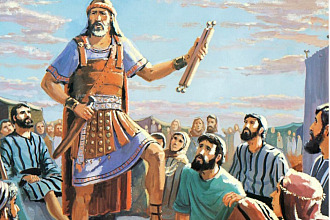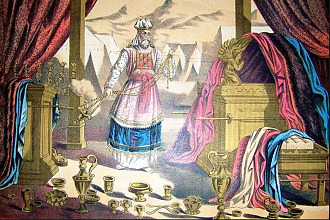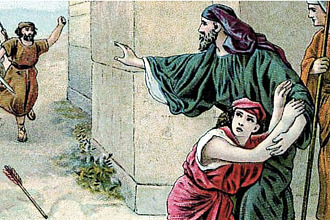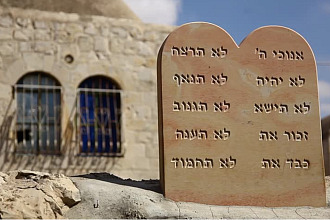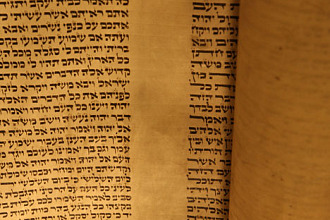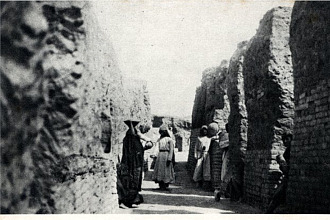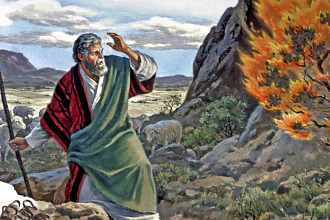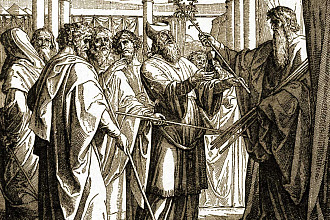Parasha for the Week: Shoftim Deuteronomy 16:18 – 21:9
Haftara for the Week: Isaiah 51:12 – 52:12
Besot Yeshua: Luke 21:5 - 28
Overview
Moshe tells Israel to appoint judges and officers in their cities. A bribe of even an insignificant sum is forbidden.
Trees are not to be planted near Hashem’s altar, as was the way of idolaters.
Blemishes in animals designated for offerings and other points of disqualification are listed.
The Sanhedrin is to make binding decisions on new situations according to Torah criteria.
Any one who refuses to accept the decisions and laws of the Sanhedrin incurs the death penalty.
A Jewish king may only have possessions and symbols of power commensurate with the honor of his office, but not for self-aggrandizement. He is to write for himself two sifrei Torah, one to be kept with him wherever he goes, so that he doesn’t become haughty.
Neither the kohanim nor the levites are to inherit land in the land of Israel, rather they are to be supported by the community by a system of tithes.
All divination is prohibited.
Hashem promises the Jewish people that He will send them prophets to guide them, and Moshe explains how a genuine prophet may be distinguished from a false one.
Cities of refuge are to be provided an accidental killer to escape the blood-avenger from the deceased’s family. However, someone who kills with malice is to be handed over to the blood-avenger.
Moshe cautions the children of Israel not to move boundary markers to increase their property.
Two witnesses who conspire to “frame” a third party are to be punished with the very same punishment that they conspired to bring upon the innocent party.
A kohen is to be anointed specifically for when Israel goes to war, to instill trust in Hashem.
Among those disqualified from going to war is anyone who has built a new house but not lived in it yet, or anyone who is fearful or fainthearted. An enemy must be given the chance to make peace, but if they refuse, all the males are to be killed.
Fruit trees are to be preserved and not cut down during the siege. If a corpse is found between cities, the elders of the nearest city must take a heifer, slaughter it, and wash their hands over it, saying that they are not guilty of the death.
"Trust in God"
The Torah states: “You shall (trust) wholeheartedly in the Almighty, your God.” (Deuteronomy 18:13). Having trust in the Almighty will give a person peace of mind and serenity. However, one should never use a claim of trust in the Almighty to condone laziness or rash behavior. There is a thin line between the virtue of trusting in God and the fault of carelessness and lack of taking responsibility.
A well known story can illustrate this point. The story is told of a man who lived by a river. A policeman warns him to evacuate because of a flood warning. The man rejects the offer and says, “I have perfect trust in the Almighty to save me.” As the water rises, a person in a boat offers to take him to safety. The man again replies with his proclamation of trust and refuses the ride. Finally, as the man is sitting on his roof, a helicopter comes to rescue him; again the man proclaims his trust and refuses the rescue. The water rises, the man drowns and is finally standing in judgment before the Almighty. “God, I had perfect trust in you — how could you let me down?” The Almighty replies, “But, my son, I sent the policeman, the boat and the helicopter, and you refused my help.”
"The King of Israel"
The book of Deuteronomy speaks about the future king of Israel and gives some rules to regulate king’s life and duties. “You may indeed set a king over you whom the L-RD your God will choose.” The king of Israel should be a member of G-d’s people “One from among your brothers you shall set as king over you. You may not put a foreigner over you, who is not your brother.” (Deuteronomy 17:15). The fact that this section of the Bible says that the king will be given to Israel after they will possess the Land means unequivocally at the very outset that it is not the role of the king of Israel to conquer the Land and secure Israel’s possession of it. Rabbi Hirsch says: It is not his role to build up power to be used externally. For it is G-d who gives the Land to Israel and with G-d’s help Israel will conquer the Land and dwell safely in it under His protection. G-d’s help, protection, and blessing are promised to Israel again and again in the Torah, and are also stressed repeatedly by Moses in his admonitions preparing Israel for the conquest of the Land. For these purposes Israel does not need a king; all that Israel needs to do — so that G-d’s promises may be fulfilled — is to be “Israel”: to prove that it is indeed a people loyal to G-d’s revelation.
Thus, as Rabbi Hirsch reminds us, that the Halachah (practical applications of G-d's laws) states that a king is appointed only after the complete conquest and settlement of the Land, and the Gemara (commentaries included in the Talmud) explicitly reject the idea that the purpose of the monarchy in Israel is military conquest.
In the Sifre (early commentary of Numbers and Deuteronomy) our verse is explained as follows: G-d gives the Land to you, and to conquer it you do not need a king; you need only to be yourselves, your real selves.
That is a wonderful lesson for us. We don’t need any other king that G-d. He is the one who conquers the Land for us, He is the one who make us victorious, because even though we should be blameless, there is no life and no salvation without our heavenly king and his Messiah. The only military conquest we will accomplish will be against the prince of this world, the Satan who has already been conquered. “And they have conquered him by the blood of the Lamb and by the word of their testimony,” (Revelation 12:11).
HAFTARA Isaiah 51:12 – 52:12
This Shabbat is the fourth Shabbat after Tisha B’Av. We are in a period called Shiva D’nechemta—”Seven weeks of comfort.” The seven Haftarot of the weeks between Tish’a B’av and Rosh Hashana are prophesies of comfort and hope for Israel and God’s people at large. Haftara: G-d himself continues to comfort Israel. “I, I am he who comforts you” (Is. 51:12). Isaiah shows us that the L-rd is aware of the situation of his people “You have forgotten the LORD, your Maker” (13). However the L-rd continues to love his people and reminds them of what he has done for them in the past “For I am the LORD your God, who stirs up the sea so that its waves roar— the LORD of hosts is his name. I have put my words in your mouth, and hidden you in the shadow of my hand, stretching out the heavens and laying the foundations of the earth, and saying to Zion, “You are my people.”” (15-16). G-d calls Israel to rise, to come back to him and to fulfill her mission “Rouse yourself, rouse yourself! Stand up, O Jerusalem,” (17). God gives another wonderful promise to Israel saying, he is the intercessor, he will plead her cause. “Thus says your Sovereign, the LORD, your God who pleads the cause of his people: See, I have taken from your hand the cup of staggering; you shall drink no more from the bowl of my wrath. “ (22).
If God is the intercessor, who will be against G-d’s people? Shaul says, “Who will separate us from the love of Messiah? Will hardship, or distress, or persecution, or famine, or nakedness, or peril, or sword? As it is written, “For your sake we are being killed all day long; we are accounted as sheep to be slaughtered.” No, in all these things we are more than conquerors through him who loved us (Rom. 8:35-37).
Jerusalem is still a holy city and will no longer be threatened by the nations. “Put on your beautiful garments, O Jerusalem, the holy city; for the uncircumcised and the unclean shall enter you no more. “ (Is. 52:1). Jerusalem will be joyous for G-d’s protection. “Break forth together into singing, you ruins of Jerusalem; for the LORD has comforted his people, he has redeemed Jerusalem” (9). G-d reaffirms his protection for his people, “for the LORD will go before you, and the God of Israel will be your rear guard.” (12).
Besorat Yeshua Luke 21:5 - 28
In the text of the parasha we have a very interesting and important prophecy given by G-d to the people of Israel: “The L-rd your G-d will raise up for you a prophet like me from among you, from your brothers—it is to him you shall listen— just as you desired of the L-rd your G-d at Horeb on the day of the assembly, when you said, ‘Let me not hear again the voice of the L-rd my G-d or see this great fire any more, lest I die.’ And the L-rd said to me, ‘They are right in what they have spoken. I will raise up for them a prophet like you from among their brothers. And I will put my words in his mouth, and he shall speak to them all that I command him. And whoever will not listen to my words that he shall speak in my name, I myself will require it of him. But the prophet who presumes to speak a word in my name that I have not commanded him to speak, or who speaks in the name of other G-ds, that same prophet shall die.’ And if you say in your heart, ‘How may we know the word that the L-rd has not spoken?’— When a prophet speaks in the name of the L-rd, if the word does not come to pass or come true, that is a word that the L-rd has not spoken; the prophet has spoken it presumptuously. You need not be afraid of him.” (Deuteronomy 18:15–22). G-d has sent to Israel many prophets, but not one of these prophets could be compared to Moses fulfilling this prophecy. However, let’s remember that for the Jewish people the gift of prophecy has not stopped with Malachi, the last prophet of the Hebrew Bible. Jewish scholars affirm that the gift of prophecy has been given to G-d's people continuously, until today. That is why Maimonides, whose name is Moses ben Ma•mon was compared to Moses, writing many books, serving kings in different countries, and being a master in many scientific domains. However, if Maimonides had great influence on the Jewish people, his influence was not worldwide in the exact way of Moses. Objectively, only two people living after Moses had a worldwide influence, Yeshua and Mohammed. But the text of Deuteronomy 18 and the Tractate Sanhedrin folio 89a and 90a list five characteristics of true and false prophets.
Moses said positively: 1) "I will put my words in his mouth," 2) "he shall speak to them all that I command him," and said negatively 3) "whoever will not listen to my words that he shall speak in my name," 4) "the prophet who presumes to speak a word in my name that I have not commanded him to speak," 5) he "who speaks in the name of other G-ds." That means a true prophet should speak the word of G-d, share it with G-d's people and practice it in his daily life, in the opposite the false prophets are those who says what was not told them, those who prophesies in the name of an idol, those who suppress G-d's prophecy, or disregard the words of a prophet. The Talmud adds those who partially cancel and/or confirm any precept of G-d. It is clear with all these characteristics that Mohammed is a false prophet, he changed the word of G-d, the canceled and modified the commandments of God, and by giving the Koran to the world, he added to the word of G-d when the Torah said clearly “You shall not add to it or take from it.” (Deuteronomy 12:32). Now what about Yeshua. It is clearly attested that he was sent by the Father, and all the words he preached came from G-d: “So Yeshua said to them, “I do nothing on my own authority, but speak just as the Father taught me.” (John 8:28). The issue is that some believers have so much distorted the words and teaching of Yeshua, that Jews think Yeshua was not faithful to the Torah and did not teach his disciples to be faithful to the Torah, which is not correct. Reading the Gospels helps us to discover that the teaching of Yeshua came from G-d, and that he was completely faithful to the Torah of Moses. Yeshua is the Messiah and a true prophet, seeing the Temple with his talmidim he said: “As for these things that you see, the days will come when there will not be left here one stone upon another that will not be thrown down.” (Luke 21:6–7), he was taught by G-d that the Temple would be destroyed and that happened 40 years later. He announced that false prophets and false Messiahs would appear: ““See that you are not led astray. For many will come in my name, saying, ‘I am he!’ and, ‘The time is at hand!’ Do not go after them.” (8). He announced the difficult time: “And when you hear of wars and tumults, do not be terrified, for these things must first take place, but the end will not be at once.”
Then he said to them, “Nation will rise against nation, and kingdom against kingdom. There will be great earthquakes, and in various places famines and pestilences. And there will be terrors and great signs from heaven.” (9–11). We will be protected : “But not a hair of your head will perish.” (18). Yeshua was a true prophet, all the prophesies he gave in the name of G-d happened.
But there is more, because in this text Yeshua announced how his return is to take place: “And there will be signs in sun and moon and stars, and on the earth distress of nations in perplexity because of the roaring of the sea and the waves, people fainting with fear and with foreboding of what is coming on the world. For the powers of the heavens will be shaken. And then they will see the Son of Man coming in a cloud with power and great glory. Now when these things begin to take place, straighten up and raise your heads, because your redemption is drawing near.” (Luke 21:25–28). Yeshua is in direct continuity with the prophets of the Hebrew Bible who announced the coming of the Messiah from the Cloud: ““I saw in the night visions, and behold, with the clouds of heaven there came one like a son of man, and he came to the Ancient of Days and was presented before him. And to him was given dominion and glory and a kingdom, that all peoples, nations, and languages should serve him; his dominion is an everlasting dominion, which shall not pass away, and his kingdom one that shall not be destroyed.” (Daniel 7:13–14). Only a few Jews today believe in the corporal and glorious coming of the "Son of Man," most of the Jews believe in a Messianic era, without a physical Messiah, They replaced him by the concept of "Tikun Olam" repairing the world, it is not anymore the Messiah who repair the world but G-d's people by his action on the earth and its environment. That is not the teaching of the Bible and of Yeshua, that is why Yeshua is the true prophet that Moses announced in Deuteronomy 18, who will come very soon as the "Son of Man" and who will be obeyed by all the nations.








